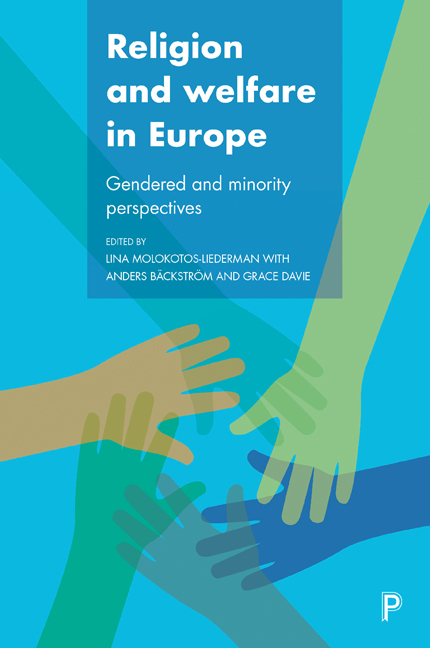Book contents
- Frontmatter
- Contents
- List of tables, figures and maps
- Acknowledgements
- Notes on contributors
- one Introduction
- Part One Thinking methodologically: approaches to research and practice
- Part Two Thinking regionally: key case studies in welfare and religion in Europe
- Part Three Gendered and minority perspectives
- Part Four Drawing the threads together
- Appendix: the WaVE team
- Index
Two - Between contextuality and comparability: a dilemma in qualitative comparative case studies
Published online by Cambridge University Press: 05 April 2022
- Frontmatter
- Contents
- List of tables, figures and maps
- Acknowledgements
- Notes on contributors
- one Introduction
- Part One Thinking methodologically: approaches to research and practice
- Part Two Thinking regionally: key case studies in welfare and religion in Europe
- Part Three Gendered and minority perspectives
- Part Four Drawing the threads together
- Appendix: the WaVE team
- Index
Summary
As a young assistant professor teaching public administration, I sometimes took my students with me to a municipality in northern Jutland, Denmark. There was (and still is) a regular ferry service over the Skagerrak between the towns of Kristiansand in Norway, where I lived and worked (and still do), and Hirtshals in Denmark. My contacts in the Danish municipality presented some boxes and arrows on paper to the students. Through these simple presentation techniques (this was long before PowerPoint), the students gained some valuable insights into the different ways that public services might be organised, each with its advantages and disadvantages. In other words, they encountered the intellectual blessings of comparative analysis.
The main topic of this chapter is to discuss the tensions inherent in the strategy of comparing case studies, especially those that use mainly qualitative methods. I was a methodological adviser for the Welfare and Values in Europe: Transitions Related to Religion, Minorities and Gender (WaVE) project from start to finish, so there is an implicit element of self-criticism in my text. It is true that my reflections are partly inspired by several years of contact with the WaVE project and its research team. However, my aim is to provoke a more general discussion, which is not primarily intended to be an overall evaluation of WaVE. Furthermore, I do not only point to dilemmas that the individual researcher may face. Social science consists increasingly of collective ventures, and I try to trace some institutional factors that may influence the researcher's journey between rigid standardisation and isolated case studies.
Tracing social mechanisms
The French philosopher Auguste Comte is often identified in textbooks as the father of sociology, because in 1830 he coined the term ‘sociology’. The fact that he first suggested the term ‘social physics’ for the new discipline was a sign of his optimism on behalf of science. Just as the natural sciences of his time were successfully uncovering laws of nature and using insights to make technological innovations, Comte envisaged a future where sociology's grasp of universal social laws could be used to create a society closer to perfection.
- Type
- Chapter
- Information
- Religion and Welfare in EuropeGendered and Minority Perspectives, pp. 25 - 36Publisher: Bristol University PressPrint publication year: 2017



